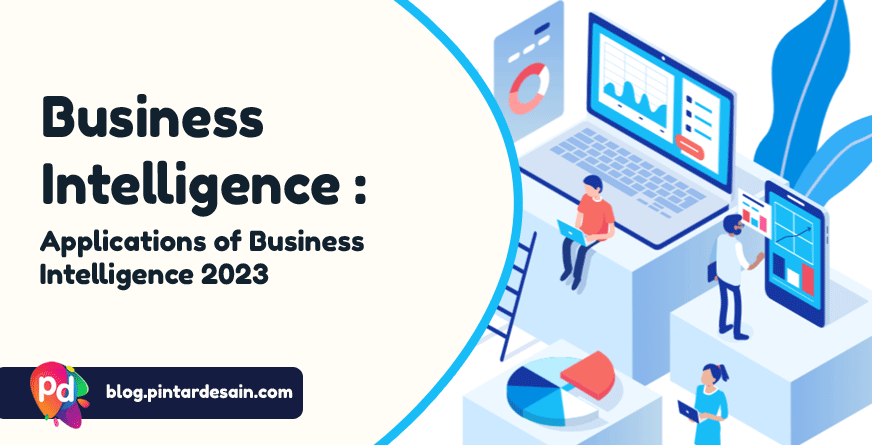Business Intelligence (BI) has become an essential tool for companies to gain insights from their data and make informed decisions. BI involves the use of technologies, applications, and practices for collecting, integrating, analyzing, and presenting business information. In this article, we will discuss some of the applications of business intelligence in various industries.
Applications of Business Intelligence

1. Finance
The finance industry is one of the most data-driven industries, making it a prime candidate for BI solutions. BI tools can help financial institutions analyze market trends, customer behavior, and risk factors. With BI, finance companies can make more informed decisions regarding investments, loans, and other financial products.
2. Healthcare
Healthcare organizations generate a massive amount of data, from patient records to medical research. BI can help healthcare providers analyze this data to improve patient outcomes, reduce costs, and optimize resources. BI tools can also assist in identifying areas for improvement in clinical operations, such as reducing wait times and improving patient satisfaction.
3. Retail
Retailers can use BI to analyze sales data, inventory levels, and customer behavior to improve operations and increase profits. BI can help retailers optimize pricing strategies, identify popular products, and forecast demand. Additionally, BI can provide insights into customer behavior, allowing retailers to offer targeted promotions and personalized experiences.
4. Manufacturing
BI can help manufacturers optimize production processes, reduce waste, and improve quality control. BI tools can analyze data from sensors and other devices on the factory floor to provide real-time insights into production processes. Additionally, BI can help manufacturers track inventory levels, analyze supply chain data, and optimize logistics operations.
5. Education
Education institutions generate a vast amount of data, from student performance to teacher evaluations. BI can help schools and universities analyze this data to improve student outcomes and teacher effectiveness. With BI, education institutions can identify areas where students need additional support, optimize resource allocation, and track progress towards academic goals.
6. Government
Governments generate vast amounts of data, from census data to crime statistics. BI can help government agencies analyze this data to improve operations and make informed policy decisions. With BI, government agencies can identify areas for improvement in public services, optimize resource allocation, and track progress towards policy goals.
7. Hospitality
The hospitality industry can use BI to improve guest experiences, optimize operations, and increase profits. BI tools can help hotels analyze guest feedback, optimize pricing strategies, and forecast demand. Additionally, BI can assist in managing resources such as inventory and labor to ensure the smooth running of hotel operations.
8. Marketing
Marketing departments can use BI to analyze customer behavior, identify trends, and optimize campaigns. BI tools can help marketers understand which marketing channels are most effective, identify target audiences, and monitor the performance of marketing campaigns. With BI, marketing teams can make data-driven decisions that lead to improved ROI and increased customer engagement.
9. Transportation
Transportation companies can use BI to optimize logistics operations, reduce costs, and improve customer service. BI tools can help transportation companies track vehicle performance, optimize routes, and manage inventory. Additionally, BI can help transportation companies understand customer behavior, such as preferred routes and delivery times, to provide personalized experiences and increase customer loyalty.
Read More : Business Intelligence Concepts, Components, and Applications
10. Energy
Energy companies can use BI to optimize resource allocation, reduce waste, and improve sustainability. BI tools can help energy companies analyze data from sensors and other devices to optimize production processes, reduce downtime, and improve asset utilization. Additionally, BI can assist in managing resources such as energy consumption and emissions to ensure compliance with regulations and improve sustainability.
11. Insurance
The insurance industry can use BI to analyze customer behavior, assess risk, and improve operations. BI tools can help insurance companies identify patterns and trends in claims data, assess the effectiveness of underwriting policies, and optimize pricing strategies. Additionally, BI can assist in managing resources such as staff allocation and customer service to ensure optimal operations.
12. Real Estate
The real estate industry can use BI to analyze market trends, assess property values, and optimize operations. BI tools can help real estate companies identify trends in property values and sales, assess the effectiveness of marketing campaigns, and forecast demand. Additionally, BI can assist in managing resources such as staff allocation and property maintenance to ensure optimal operations.
13. Sports
The sports industry can use BI to analyze player performance, assess fan behavior, and improve operations. BI tools can help sports teams identify patterns and trends in player data, assess the effectiveness of coaching strategies, and optimize player selection. Additionally, BI can assist in managing resources such as ticket sales and venue operations to ensure optimal fan experiences.
14. Non-profit
Non-profit organizations can use BI to analyze donor behavior, assess impact, and optimize operations. BI tools can help non-profits identify patterns and trends in donor data, assess the effectiveness of fundraising campaigns, and forecast future donation trends. Additionally, BI can assist in managing resources such as staff allocation and program operations to ensure optimal impact.
15. Telecommunications
Telecommunications companies can use BI to optimize network performance, reduce costs, and improve customer service. BI tools can help telecommunications companies track network performance, optimize resource allocation, and monitor customer feedback. Additionally, BI can help telecommunications companies identify trends in customer behavior, such as preferred service channels and usage patterns, to provide personalized experiences and increase customer loyalty.
In conclusion, the applications of business intelligence are diverse and wide-ranging, with potential benefits for companies and organizations across many different industries. BI tools can help companies make data-driven decisions that lead to improved operations, increased profitability, and better customer experiences. As data continues to become an increasingly valuable asset for companies, the importance of business intelligence in decision-making will only continue to grow.